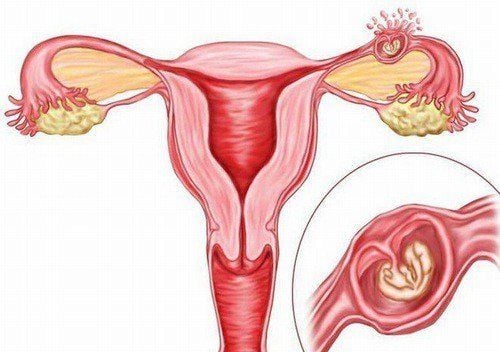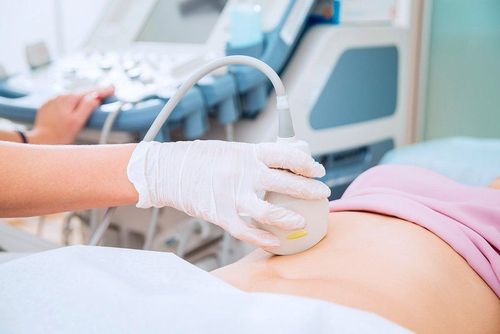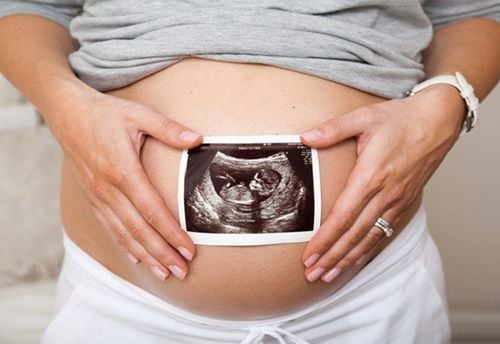This is an automatically translated article.
The article was consulted with Specialist Doctor II - Nguyen Thi Minh Tuyet - Head of Obstetrics and Gynecology Department - Vinmec Central Park International General Hospital.An ectopic pregnancy can be life-threatening if left untreated. However, about 50% of pregnant patients have no identifiable risk factors. Recognizing the early signs of an ectopic pregnancy plays an important role in the timely treatment and treatment of patients.
1. What is an ectopic pregnancy?
An ectopic pregnancy is when a fertilized egg implants and grows outside the uterus. More than 90% of ectopic pregnancies occur in the fallopian tubes. As the pregnancy progresses, an ectopic pregnancy in the fallopian tube can rupture the tube - a major cause of internal bleeding, which is life-threatening and may require immediate emergency surgery.2. What are the risk factors for ectopic pregnancy?
Risk factors for ectopic pregnancy include:History of ectopic pregnancy. History of tubal surgery, previous abdominal and pelvic surgery. Mother has pelvic inflammatory disease, sexually transmitted infections (STIs). Endometrial optimism. In addition, factors can increase the risk of ectopic pregnancy in women:
Smoking. Over the age of 35. Have a history of infertility. Using assisted reproductive technology such as in vitro fertilization (IVF). Approximately 50% of patients with ectopic pregnancy have no identifiable risk factors. Women who are sexually active should be aware of any changes in their body, especially when there are symptoms of an ectopic pregnancy.

3. Symptoms of ectopic pregnancy
Signs of an ectopic pregnancy can be similar to those of a normal pregnancy, such as no period, breast tenderness, upset stomach. Some other signs such as:
Unusual bleeding. Back pain. Mild pain in the abdomen or pelvis. Mild pain on one side of the pelvis. At this stage, it can be difficult to distinguish between a pregnancy or an ectopic pregnancy. Therefore, clients with abnormal bleeding and pelvic pain should seek medical advice.
However, as the ectopic pregnancy develops, more serious signs can appear, especially when the fallopian tubes rupture:
Abdominal or pelvic pain that is sudden and severe. Shoulder pain. Fatigue, dizziness, fainting. A ruptured fallopian tube can lead to internal bleeding, which can be life-threatening. Therefore, customers with severe, sudden pain, shoulder pain, weakness, fatigue, should go to the emergency room.
4. Diagnosis of ectopic pregnancy
When the client has no symptoms, but the obstetrician-gynecologist suspects that the client has an ectopic pregnancy, the doctor may order:Pelvic examination. Ultrasound to check the growth position of the fetus. A blood test that measures HCG levels.
5. Treatment of ectopic pregnancy
An ectopic pregnancy cannot move or be moved to the uterus, so an ectopic pregnancy definitely cannot be delivered and requires treatment. The two treatment methods are Medical (medication) and Surgery. Post-treatment follow-up is required over a period of several weeks.6. Medical treatment

6.1. The drug used to treat ectopic pregnancy The most commonly used drug is methotrexate, which has a mechanism to prevent the division of cells, the pregnancy mass will then be absorbed by the body after 4-6 weeks and fallopian tubes are still preserved.
6.2. When is medical treatment possible in women with ectopic pregnancy? Methotrexate may be used if the fallopian tubes have not ruptured. In addition, several factors need to be considered before deciding to use methotrexate, one of the most important factors is that after methotrexate treatment, the patient is healthy enough to draw blood, check hCG levels. in blood. Women who are breastfeeding or have health problems should not be treated with methotrexate.
6.3. Methotrexate Treatment Procedure Patients are usually treated with a single injection of methotrexate. Before the injection, the doctor will order a blood test to measure hCG levels and organ function. If the reduction in hCG levels after the first injection is insufficient, a second dose may be recommended. After treatment, the patient will be closely monitored until the hCG level is no longer detectable in the blood.
6.4. Possible side effects or risks of methotrexate treatment The side effect most women experience during methotrexate treatment is abdominal pain. In addition, some people experience vaginal bleeding or spotting. In addition, there are some side effects such as: Nausea, Vomiting, Diarrhea, Dizziness, dizziness.
Follow-up of the patient until the end of methotrexate treatment is very important. The risk of fallopian tube rupture will remain until the end of treatment completely. Customers need to go to the medical facility immediately if they have symptoms of a fallopian tube rupture such as sudden abdominal pain, shoulder pain, feeling weak.
6.5. What should patients avoid while on methotrexate treatment? Need to abstain:
Strong exercise. Sexual relations. Alcohol Alcohol. Vitamins and foods containing folic acid such as cereals, bread or pasta, peanuts, dark leafy vegetables, orange juice and legumes. Non-steroidal anti-inflammatory drugs (NSAIDs) such as ibuprofen, as these drugs may interfere with the action of methotrexate. Food releases gas. Prolonged sun exposure, as methotrexate can lead to sun sensitivity.
7. Ectopic pregnancy surgery

7.1 When does an ectopic pregnancy need surgical treatment? If a fallopian tube ruptures, emergency surgery is needed. In some cases, even if the fallopian tubes have not ruptured, surgery is still needed. The pregnancy can be removed from the fallopian tube, or the entire fallopian tube must be removed along with the pregnancy.
7.2. How is surgery done? Usually, the patient will have laparoscopic surgery. The doctor will insert a special, long, thin instrument into the abdomen through a small incision. This device is called an endoscope. There is a camera attached to the tube and the image is displayed on a screen. The patient is anesthetized throughout the surgery.
7.3. Possible side effects or risks of surgical treatment Before surgery, patients will be carefully advised by their doctor about possible side effects as well as possible risks, which may include pain, fatigue fatigue, bleeding, or infection.
7.4. Patient status after treatment Regardless of the method chosen, patients may experience fatigue, pain or abdominal discomfort for a few weeks after treatment. Patients should seek medical attention if the medication does not help.
Besides, it will take some time for hCG levels to return to normal, so it is possible that after a few months after treatment, your period may not be stable, some women You can feel like you're still pregnant.
8. Does an ectopic pregnancy affect future pregnancies?
Ectopic pregnancy is the highest risk factor for ectopic pregnancy in subsequent pregnancies. Therefore, women experiencing this condition should pay attention, monitor and consult with a specialist doctor carefully. If you have unusual symptoms, you should be examined and consulted with a specialist.Please dial HOTLINE for more information or register for an appointment HERE. Download MyVinmec app to make appointments faster and to manage your bookings easily.
References: Acog.org














